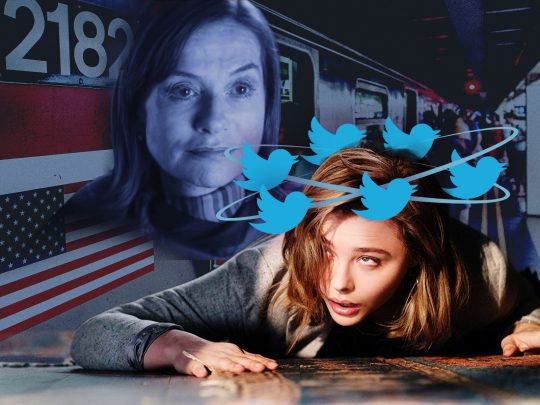Greta is a film about a stranger who tries to comfort a lonely individual. This effort at human connection is repaid with terroristic stalking—endless efforts to reengage, escalating from cell phone notifications to in-person contact. When the authorities are confronted with information about the stalker's misbehavior, the victim is told that there's nothing to be done. The process of getting this cancer removed from her life could take months. She should just ignore it. The whole thing worsens until the victim rightfully fears for her life, worried she'll wind up in a box.
Greta, in other words, is a perfect metaphor for Twitter.
From the film's tagline ("Don't take the bait," one of the first rules for dealing with trolls on the microblogging site) to the indifference of those with power to stop harassment to the fact that no one you meet is ever quite who they appear, Neil Jordan's latest film feels like a 90-minute warning about the dangers of our favorite workplace timewaster.
Frances (Chloë Grace Moretz) is new to Manhattan, sharing a spacious loft with idle rich girl Erica (Maika Monroe). While coming home from her job as a waitress, Frances spots an unattended handbag on a subway car. Instead of saying something after seeing something—the correct response to misplaced knapsacks, as Erica notes—she instead plans to return it to the owner whose NYC ID rests inside.
The owner is Greta Hideg (Isabelle Huppert). Pleasantly surprised by the return of her bag, she invites Frances in for coffee and cookies. Greta's empty-nester loneliness resonates with Frances' own sense of hollowness, her mother having recently passed and her father having moved on too quickly for her tastes. Erica is nonplussed by her roommate's new relationship, and for good reason: In this day and age, making contact with strangers rarely works out well.
Sure enough, things spiral out of control after Frances tries to cut off contact with Greta. First come the calls, then the unexpected appearances. The cops and the courts are no help, the bureaucracy's hands are tied when no actual violence has been done and only public streets made use of. Neither the anonymity of mass transit nor the comfort of home, nor the professional veneer of work, provides safety. Greta manages to pierce the cloak of atomized urban life by manifesting, almost supernaturally, wherever Frances happens to be.
Once things get weird, Huppert plays Greta as either grimly determined—a Terminatrix of sorts, stalking her prey across Facebook pages and NYC's streets with equal aplomb—or with a sort of strangely dainty flightiness. She's stone still and staring or on the tips of her toes, dancing about. It gives the picture a manic-depressive mood, the feverishly frantic and funny moments relieving some of the pressure building up inside of audiences as Greta's schemes increase in craziness.
Monroe shines as Erica, Frances's pampered friend whose spine has an unexpected amount of steel to it. She embodies the sort of insouciant world-weariness that only a twentysomething who knows nothing can truly pull off. Jordan also uses Monroe to great effect in the film's best sequence, a terrifying chase through the alleys, streets, and subways of New York. Greta is taking creepshots of Erica and sending them to Frances, a reminder that no one is safe from her. Yet Erica cannot see her stalker, the older woman blending into the crowd.
Jordan is playing with the schizoid nature of our crowded streets: they are both anonymizing (we can blend in with anyone) and alienating (our creation of personal bubbles renders us forever alone despite being surrounded, a terrifying notion when someone has singled you out for abuse). Which, again, calls to mind social media, modernity's biggest mistake, one that grants anonymity and draws attention to any specific individual unfortunate enough to come in for special consideration.
